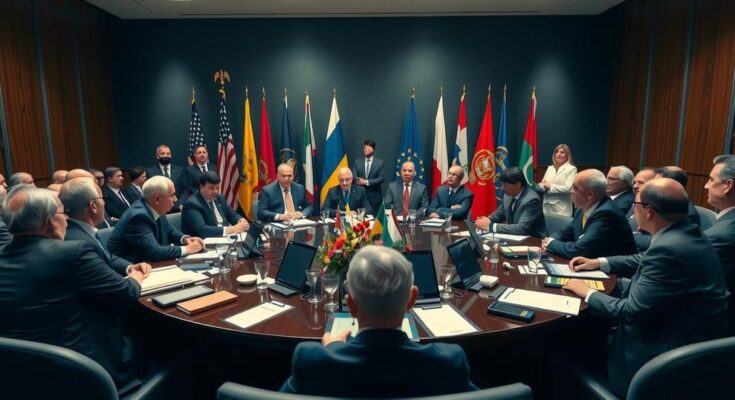The G20 summit in Brazil is addressing key global issues such as the conflicts in the Middle East and Ukraine, the climate crisis, and the potential return of Donald Trump to the U.S. presidency. While hopes for a substantial geopolitical declaration are low, discussions focus on hunger, poverty, climate finance, and the implications of Biden’s policy shifts regarding Ukraine. Security concerns also loom large after a recent attack on Brazil’s Supreme Court.
Leaders of the Group of 20 (G20) commenced their summit in Rio de Janeiro, Brazil, amid pressing global concerns, including conflicts in the Middle East and Ukraine, as well as the challenges posed by climate change. This summit, held on Monday and Tuesday, also coincides with the reemergence of Donald Trump in American politics following his recent election victory. Brazilian President Luiz Inácio Lula da Silva welcomed attendees at the Museu de Arte Moderna, underscoring his administration’s commitment to addressing hunger and environmental issues alongside international warfare negotiations. While the summit’s agenda aims to foster cooperation among major economies, the prospects for a comprehensive geopolitical declaration appear constrained. U.S. President Joe Biden, attending possibly his final G20 meeting, faces challenges with the rising influence of his Chinese counterpart, President Xi Jinping. Discussions are expected to navigate the complexities of ongoing military conflicts, as revealed by an unnamed Brazilian foreign ministry source expressing concerns over differing national positions on the final summit communique. The urgency of the summit is underscored by Biden’s recent decision to permit Ukraine to utilize U.S. long-range missiles against Russian targets, prompting a potential reevaluation of military strategies among European allies. Concurrently, G20 leaders are urged to revitalize stalled UN climate negotiations in Azerbaijan, with Secretary-General Antonio Guterres stressing the need for substantial commitments from the world’s largest polluters, comprising 80 percent of global emissions. The gathering is marked by heightened security measures in response to a recent attack on Brazil’s Supreme Court, reflecting ongoing domestic tensions. As Biden endeavors to solidify his legacy amid this geopolitical turmoil, discussions are anticipated to address not only military conflicts but also crucial issues posed by climate change. The aftermath of COP29’s stagnation on climate finance for developing countries hangs in the balance. In the context of rising global temperatures and escalating extreme weather incidents, including record droughts in Brazil, leaders are pushed to consider renewing commitments towards renewable energy. Notably absent from this gathering is Russian President Vladimir Putin, who faces international scrutiny over the Ukraine conflict. President Lula has emphasized the necessity of addressing pressing poverty issues to ensure comprehensive global discussions covering those most vulnerable globally. The inaugural day of the summit also features the launch of the “Global Alliance against Hunger and Poverty,” an initiative aligned with Lula’s vision for tackling socio-economic disparities and advocating for higher taxes on billionaires. This agenda has met resistance from some delegates, particularly from Argentina, leading to tense discussions regarding consensus on key points of the summit. The outcome of these deliberations will shape future priorities for the G20 coalition in addressing both humanitarian and environmental crises.
The G20 summit, a forum for major global economies, serves as a platform for leaders to discuss pressing international issues, including economic cooperation, security concerns, and environmental sustainability. This year’s summit in Brazil takes place during a critical moment characterized by multiple ongoing conflicts, significant climate challenges, and the geopolitical dynamics shaped by the potential return of Donald Trump to U.S. presidential leadership. The summit’s discussions aim to address the impasse in global climate negotiations and provide a unified stance on the crises in Ukraine and the Middle East while also tackling issues of poverty and hunger.
In conclusion, the G20 summit in Rio de Janeiro represents a crucial diplomatic engagement amid an array of global crises, including war, climate challenges, and economic disparities. As leaders discuss the urgent need for renewed cooperation on these issues, the conflicting national interests and geopolitical divisions may hinder consensus. A focused approach on critical humanitarian issues, particularly regarding poverty alleviation and environmental sustainability, remains a central theme, exemplified by Lula’s initiatives. The outcomes of this summit could have lasting implications for international relations and global governance.
Original Source: www.france24.com




